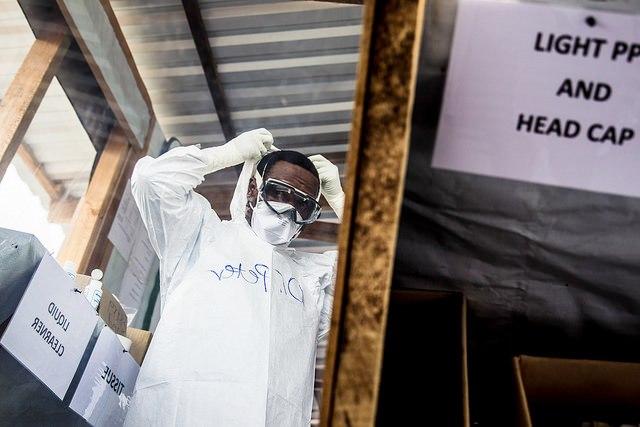Tekmira Pharmaceuticals announced today that it has suspended development of TKM-Ebola, a drug cocktail that showed disappointing human trial results in West Africa, as a convalescent plasma trial at a Doctors Without Borders (MSF) facility in Guinea proceeded with no ill effects in patients so far.
In other developments, a Swiss-based study of a sick healthcare worker shed new light on disease treatment and virus shedding in different body fluids.
Company shelves experimental drug
The announcement about TKM-Ebola came today in a Tekmira press release about a corporate name change to Arbutus Biopharma and its focus on developing hepatitis B virus treatments. In suspending TKM-Ebola development, the company said that a joint reevaluation of its contract with the US Department of Defense is under way.
Tekmira's update on the status of the drug comes about 1 month after phase 2 trial results in Sierra Leone suggested that it is unlikely to benefit humans. Animal studies of TKM-Ebola had shown promising results, and the drug had been used on an emergency basis to treat some healthcare workers who were infected in the outbreak, though experts warned that it would be difficult to interpret the results based on those results.
TKM-Ebola is a short-strand RNA drug cocktail that was modified to combat the Makona outbreak strain that has fueled West Africa's outbreak. It targets three of seven Ebola virus proteins.
It was dogged by problems in the phase 1 trial, when some subjects reported flulike symptoms. The US Food and Drug Administration had placed a clinical hold on the drug to look into the multiple-ascending-dose part of the trial, but then modified its action to allow repeat dosing at a lower dose, which enabled the trial to resume.
When it announced the trial suspension in June, Tekmira said data analysis was ongoing and full results on efficacy and tolerability would be made available as soon as possible.
Convalescent serum trial update
In another treatment development, MSF said a convalescent serum trial at its facility in Nongo, Guinea, has enrolled 101 people over the last few months, with no ill effects reported so far, according to a Jul 17 update on the outbreak. Patients at the Nongo treatment unit have the option to receive plasma donated by Ebola survivors.
Efficacy results for convalescent serum treatment aren't publicly available yet, but researchers hope to release them in the coming weeks, the group added.
Also in its update, MSF said over the past 8 weeks the number of new cases in the outbreak region has stagnated at around 30 new confirmed cases each week, "a number that would be considered a disaster under normal circumstances."
MSF's international president, Joanne Liu, MD, said in the statement that despite the focus on recent reports on how to improve future outbreak response, the current outbreak still isn't under control. "On Ebola, we went from global indifference, to global fear, to global response, and now to global fatigue," she said. "We must finish the job."
Viral load and body fluid findings
Meanwhile, detailed testing at a Swiss hospital on a 43-year-old doctor infected with Ebola in Sierra Leone found that viral decay occurred in two phases, once starting 72 hours after symptom onset before any antiviral interventions, with acceleration in viral load decay after ZMAb infusion and oral favipiravir treatments began.
The clinical case findings, by a Swiss-based international research group, were published yesterday in The Lancet Infectious Diseases. ZMAb is a laboratory-grade version of the Ebola drug ZMapp, an experimental monoclonal antibody in development for Ebola treatment.
The half-life after antiviral treatment fell from 26 to 9.5 hours, accompanied by rapid clinical improvement. The authors said though it's not clear if the trend was due to the natural disease course, immune response, or a specific effect from either drug, but the rapid decay they saw after the first ZMAb infusion supports a treatment effect.
The team also measured daily viral load in other body fluids. Urine was negative during the early phase of the disease, saliva was positive during the first few days, and nasopharyngeal swabs were negative.
However, urine remained positive for viral RNA even after blood tests were negative for several days, and stool was highly positive and remained so for several days.
The authors found discrepancies among different tests on viral loads during the convalescent phase, and they suggested that infection control guidelines shouldn't overemphasize low-concentration RNA detection in blood for implementing isolation.
Genetic sequencing found a low number of mutations, suggesting that environmental pressure had a small effect on virus evolution. Researchers didn't find any potential antiviral treatment–related mutations.
In a commentary on the study in the same issue, Sylvain Baize, PhD, with the Pasteur Institute in Lyon, France, wrote that the analysis showed typical features of Ebola disease and suggested the patient had a severe infection. He said the finding that virus shedding persisted in urine and stool after viremia cleared should be kept in mind when clinicians manage the discharge of Ebola patients.
He added that treatment in modern intensive care units has rapidly improved the understanding of the disease, but data need to be shared to truly reap the benefits of deep study of the virus's pathogenesis.
See also:
Jun 20 Tekmira press release
Jul 17 MSF statement
Jun 19 CIDRAP News scan "Early trial results for Ebola drug are disappointing, company says"
Jul 19 Lancet Infect Dis abstract
Jul 19 Lancet Infect Dis commentary abstract


















